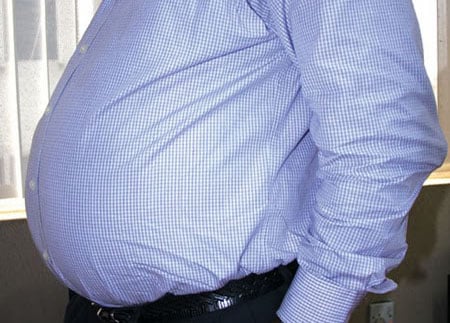She put it rather plainly: “Most men I saw at the airport today seem to have bulging stomachs. Have you noticed that seems to be a growing trend among Nigerian men?” That was my wife. I didn’t know how to respond.
I think it was the way she put the question that caught me unawares. Can you imagine me saying to her, for example: “Mama, most women I saw at the shopping mall yesterday seem to have fat butts. Is that a growing problem among Nigerian women?”
Well, I didn’t say that and I’m not asking for a response, either. If we leave the messenger for a moment and just stay on the message, I think we might agree that she has a point.
I have, of course, noticed more and more men jogging every morning in my neighbourhood, but it’s a mixed bag, really – different ages, shapes and sizes. But I have never paid much attention to the region below the belt. Nor have I bothered to check what the obese stats are saying. What’s my business?
Advertisement
After the conversation with my wife, however, I thought I should look things up. Since a friend once told me that a potbelly can sneak up on you like a thief in the night and I wasn’t sure my wife was not speaking to me in parables, was I already there, or even on the verge? I started by looking at myself in the mirror.
My waistline looked OK and bending my head, I could see all the way down without any crooked interferences. I then moved over to my computer to research the subject. Just before that, I stopped for a moment to take it all in. When did it really become a problem?
Believe it or not, having a potbelly used to be status symbol. Many popular songs, including one by popular Yoruba musician, Wasiu Ayinde Marshall (KWAM 1), have been dedicated to this manifest sign of good living. Broomsticks like us longed for the day when prosperity would give us a belly to hold and to stroke. How else will the world know that I have arrived?
Advertisement
It’s a different world today. Even at 72kg, 5’ 11’’ tall, stomach as flat as slate and a BMI index under 30, my doctor advised a more rigorous form of exercise when I checked into a hospital on the eve of my 50th birthday in February. I was also advised to maintain low intake of fatty foods and beef, steer clear of fizzy drinks and get as much sleep as I could. I also learnt how to do a self-check for any signs of growth in the prostate by running my hands down below.
That gave me an idea of what I would have had to deal with if God had answered my prayers for a potbelly or if I had indulged myself into it. According to stats, 1.5billion people in the world are obese. Data for Nigeria are stale and sketchy but a 2014 figure based on a survey of 1,058 adults by Biomed Central Ltd in Abuja (where my wife saw the potbelly attack) indicated an obesity prevalence of 64 per cent, with women accounting for 74 per cent and men 57 per cent.
It would be interesting to see what the country’s obesity map would look like but given Abuja’s reputation for indulgence, it might well rank very high among Nigerian cities hit by the obesity epidemic.
Yet, from what I have seen in my neighbourhood in the last four or five years, it does seem that a growing number of men – and even women – in affluent parts of the city are not taking the obesity attack lying low. Since nearly two and a half years now when I first adopted the habit of walking at least 30 minutes thrice a week and then ratcheting it up to jogging 45 minutes every weekday morning, I have noticed an increasing crowd of fellow joggers-for-life, men and women.
Advertisement
It’s in the nature of these things that once you start, one regimen is not enough. Once you start with aerobics – jogging, fast walking, cycling, swimming etc. – you want to try muscle toning, and even yoga. Your appetite grows, and to be honest, you do get a heck more out of life.
But fat-loss – above or below the belt – does not come by aerobics alone. It’s a lifestyle issue. We are what we eat and those who have dangerous excess lodged in potbellies are in a sense lucky to see evidence that they must act quickly to save themselves. If as a result of careless eating habits dietary cholesterol were to clog the blood vessels, the victim might have a stomach as flat as slate but yet be at risk of potentially fatal heart conditions.
It’s in our hands, really, especially as we get older. Improvements in medicine, science and sanitation have increasingly put the prospects of longer, healthier lives at our disposal. And since that is what most normal people wish for, there’s no need for that extra load below the belt – or in any other part of the body, in fact – to enjoy the benefits of longer, healthier lives.
Ishiekwene is the managing director/editor-in-chief The Interview magazine and board member of the Paris-based Global Editors’ Network. This article is contained in the current edition of the magazine
Advertisement
Views expressed by contributors are strictly personal and not of TheCable.







